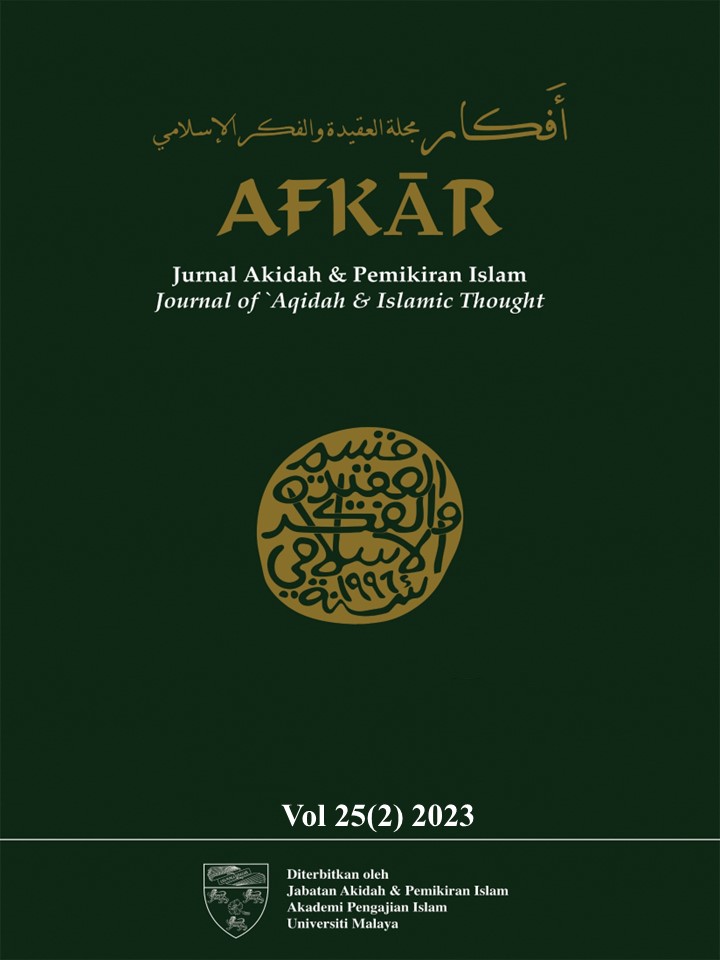Reaffirming the Concept of Plurality in the Qur’an and its Practice in the Sunnah
DOI:
https://doi.org/10.22452/afkar.vol25no2.12Keywords:
Qur’an, Shari‘ah, plurality, social governanceAbstract
The main purpose of this article is to explore as well as analyse the concept of plurality in the Qur’an around four specific issues through the inductive methodology of analyzing literature. First, how does the Islamic civilization as founded on special beliefs, which differ from those that often force the ruled people to follow the beliefs of the ruling class to the greatest extent possible? Second, under the social pluralistic system of Islam, can all people, regardless of their religious background, ethnic identity, and racial color, be fully respected and protected? Third, can citizens live in Islamic countries freely survive, possess wealth, and actively contribute to society? Fourth, what is the ideology that has driven this pluralistic social governance system to continue for more than one thousand and four hundred years in Islamic countries? By discussing these issues, the conclusion drawn in this article is that the pluralistic ideology of Islamic society has been upheld and kept by the Islamic Worldview and Shari‘ah, which may lead and enable readers to gain a new understanding of Islam itself and its current situation as whole and the Muslim countries are the best in the world to practice plurality from the history up to now.
Downloads
References
‘Abd al-Rahim, Muddathir. “Al-Islam wa Qadhaya al-Luju’ wa al-Laj’in.” In al-Islam wa Qadhaya al-‘Asr al-Ijtima‘iyyah. Amman: Royal Academy for Islamic Civilization Studies, 1997: 292-308.
‘Abd al-Rahim, Muddathir. “The Islamic Tradition.” In Human Rights and the World’s Major Religions, ed. William H. Brachney. London: Praeger Perspectives, 2005.
‘Abd al-Rahim, Muddathir. “The Roots of Revolution in the Qur’an,” Dirasat Ifriqiyyah (Khartoum) 3 (1987): 9-20.
‘Ali, ‘Abdullah Yusuf. The Meaning of the Holy Qur’an: Text, Translation and Commentary. Kuala Lumpur: Islamic Book Trust, 2005.
Adrian, Melanie. “La’cit Unveiled: A Case Study in Human Rights, Religion, and Culture in France,” Human Rights Review 8(1) (2006): 102-114.
Ahmad, Aziz. A History of Islamic Sicily. Edinburgh: Edinburgh University Press, 1975.
Al-Ahmadi, Ayatullah al-Shaykh ‘Ali. Al-Asir fi al-Islam. Qum, Iran: Mu’ssasah al-Nashr al-Islami, 1991.
Asad, Muhammad. The Message of the Qur’an. Gibraltar: Dar al-Andalus, 1980.
Al-Attas, Syed Muhammad Naquib. Prolegomena to the Metaphysics of Islam. Kuala Lumpur, Malaysia: International Institute of Islamic Thought and Civilization (ISTAC), 1995.
Al-Attas, Syed Muhammad Naquib. “The Islamic Worldview: An Outline.” In Islam and the Challenges of Modernity, ed. Sharifah Shifa al-Attas. Kuala Lumpur: International Institute of Islamic Thought and Civilization (ISTAC), 1996.
Al-Attas, Syed Muhammad Naquib. Islam and Secularism. Kuala Lumpur: International Institute of Islamic Thought and Civilization (ISTAC), 1993.
Bobbio, Norberto. The Age of Rights. Oxford: Polity Press, Cambridge, and Blackwell Publishers, 1996.
Al-Bukhari, Abu ‘Abdillah Muhammad bin Isma‘il bin Ibrahim. Sahih al-Bukhari, 3rd ed. Damascus & Beirut: Risalah Publishers, 1436H/2015.
Esposito, John L. “Foreword.” In Muslims in the West - From Sojourners to Citizens, ed. Yvonne Yazbeck Haddad. Oxford & New York: Oxford University Press, 2002.
Fazlur Rahman. Major Themes of the Qur’an. Minneapolis, MN: Bibliotheca Islamica, 1989.
Haykal, Muhammad Husayn. The Life of Muhammad, trans. Ismail Raji al-Faruqi. US: North American Trust Publications, 1976.
Ibn ‘Abd Rabbih, Shihab al-Din Abu ‘Umar Ahmad bin Muhammad al-Andalusi. Al-‘Iqd al-Farid, ed. Mufid Muhammad Qumayhah. Beirut: Dar al-Kutub al-‘Ilmiyyah, 1404H/1983.
Ibn Manzur, Abu al-Fadl Jamal al-Din Muhammad bin Mukrim. Lisan al-‘Arab, 3rd ed. Beirut: Dar al-Sadir, 1414H/1994.
Al-Jamili, al-Sayyid. Nisa’ al-Nabi Salla Allah ‘alayh wa Sallam. Beirut: Dar wa Maktabah al-Hilal, 1416H.
John Witte Jr. “Introduction.” In Religious Human Rights in Global Perspectives: Religious Perspectives, eds. John Witte Jr. & Johan D. van der Vyuer. The Hague: Martinus Nijhoff, 1966.
Locke, John. A Letter Concerning Toleration, introd. Patrick Remanell. New York: Bob Merrill, 1955.
Matar, Nabil. “John Locke and the ‘Turbanned Nations’.” Journal of Islamic Studies 2(1) (1991): 67-77.
Mez, Adam. “Jews and the Muslim Conquerors of Spain.” In The Jews of Arab Lands: A History and Source Book, ed. Norman A. Stillman. Philadelphia: Jewish Publication Society, 1979.
Mez, Adam. The Renaissance of Islam. London: Luzac & Co., 1937.
Muslim, Abu al-Husayn bin al-Hajjaj al-Qushayri al-Naysaburi. Sahih Muslim, 2nd ed. Damascus & Beirut: Risalah Publishers, 1436H/2015.
Naugle, David K. Worldview: The History of a Concept. Grand Rapids, MI, and Cambridge: William B. Eerdmans Publishing Co., 2002.
Nielsen, Jorgen. Muslims in Western Europe. Edinburgh: Edinburgh University Press, 1992 and 1995.
Ostrorog, Leon LLD. The Angora Reform. London: University of London Press, 1927.
Poston, Larry. Islamic Da’wah in the West. New York & Oxford: Oxford University Express, 1992.
Al-Razi, Fakhr al-Din Muhammad bin ‘Umar bin al-Husayn. Al-Tafsir al-Kabir (Mafatih al-Ghayb). Beirut: Dar al-Fikr, 1401H/1981.
Rida, Muhammad. Abu Bakr al-Siddiq Awwal al-Khulafa’ al-Rashidin, 2nd ed. Beirut: Dar Ihya’ al-Kutub al-‘Arabiyyah, 1369H/1950.
Sciolino, Eliane. “Guarding Secularism Religiously in France,” International Herald Tribune, February 9, 2004.
Al-Shaybani, Abu ‘Abdillah Muhammad bin al-Hasan bin Farqad. Kitab al-Siyar (The Islamic Law of Nations), trans., Majid Khadduri. Baltimore, MD: Johns Hopkins University Press, 1966.
Al-Tabari, Abu Jaʿfar Muhammad bin Jarir al-Yazid bin Kathir bin Ghalib al-Amuli. Tarikh al-Tabari (Tarikh al-Rusul wal-Muluk), 2nd ed. Egypt: Dar al-Ma‘arif, 1387H/1967.
Watt, W. M. & Pierre Cachia. A History of Islamic Spain. Edinburgh: Edinburgh University Press, 1965.
Weeramantry, Christopher Gregory. Islamic Jurisprudence: An International Perspective. New York: Macmillah, London: St. Martin’s Press, 1988, Petaling Jaya, Malaysia: The Other Press, 2001.
Al-Zuhayli, Wahbah. Athar al-Harb fi al-Fiqh al-Islami: Dirasah Muqaranah, 3rd ed. Damascus: Dar al-Fikr, 1419H/1998.
Downloads
Published
How to Cite
Issue
Section
License

This work is licensed under a Creative Commons Attribution-NonCommercial 4.0 International License.









